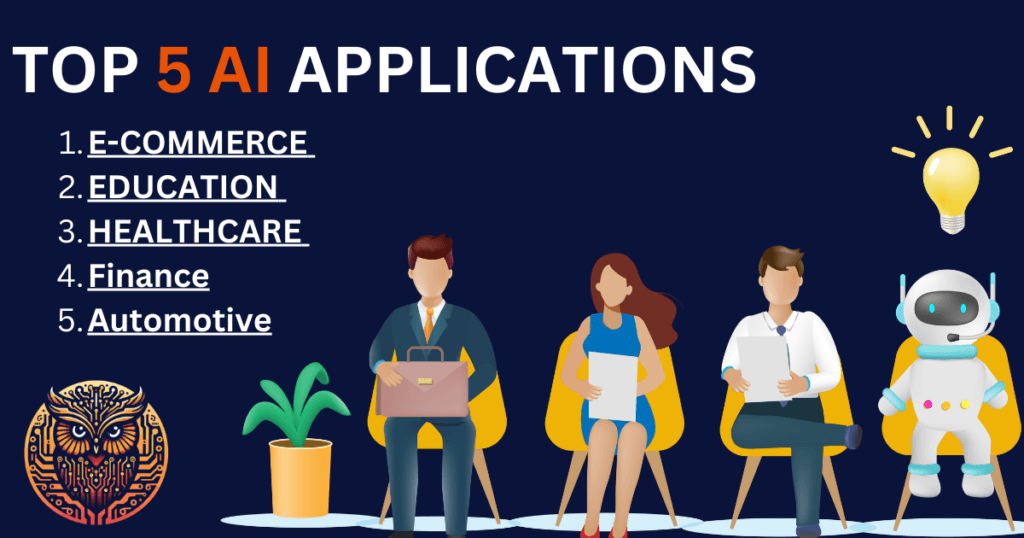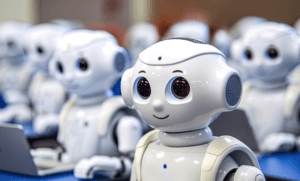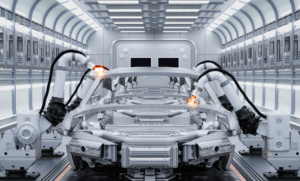Top 5 Most Powerful AI Applications in 2024: Changing the Future of Technology
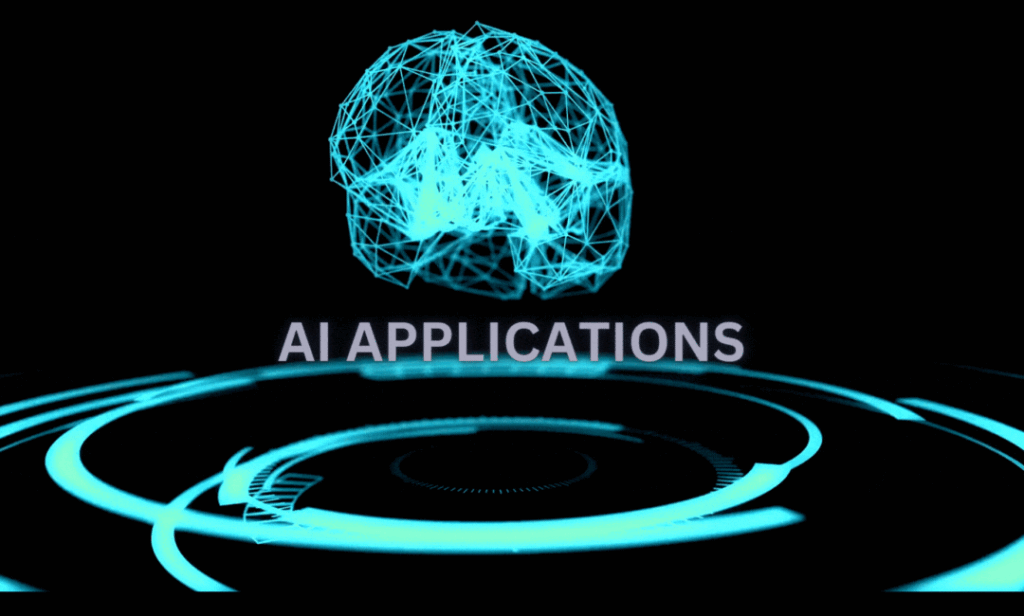
In 2024, we see the top 10 AI applications changing the way we work and live in many areas. This article looks at these amazing technologies and shows how they are ready to make a big difference in our world. Artificial Intelligence applications are now widely used in healthcare, education, finance, transportation, manufacturing, and many other fields. Here are some of the notable uses and applications of AI:
(1) AI Application in E-Commerce:

- Personalized Shopping Experiences: AI helps online stores show customers products they might like, based on their past shopping or searches. For example, if you often look at sports shoes, AI can suggest new shoe styles when you visit the site.
- Customer Service Chatbots: Many online stores now use chatbots. These are AI tools that can answer your questions, help you find products, or solve problems with orders, just like talking to a real person.
- Inventory Management: AI can predict which products will be popular and make sure there are enough in stock. This means when you order something, it’s more likely to be available and get to you faster.
- Fraud Prevention: AI is good at spotting unusual activity that might be fraud. This keeps your information safe when you shop online.
- Tailored Advertisements: Ever notice ads that seem to know what you’re interested in? That’s AI! It shows ads for products you might want, based on your online activities.
In 2023, several AI tools are exemplifying these applications in E-commerce:
Artificial Intelligence (AI) is increasingly playing a transformative role in education, offering novel solutions and enhancing learning experiences. Here are some key applications of AI in education:
- Automating Administrative Tasks: AI significantly aids educators by automating administrative duties. This includes tasks like grading, scheduling, managing enrollments, and facilitating communication with students and parents. By handling these routine tasks, AI allows educators to focus more on teaching and student interaction.
- Creating Smart Content: AI is instrumental in digitizing educational content, such as video lectures and guides. It enables the creation of interactive and customizable learning materials suitable for students of various grades. AI-driven tools can generate audio and video summaries, as well as comprehensive lesson plans, thus enriching the learning experience.
- Voice Assistants in Education: AI-powered voice assistants provide students with additional learning materials and support without direct teacher involvement. These tools can answer common questions and provide access to educational resources, reducing the need for printed materials and enhancing the learning experience.
- Personalized Learning: AI technologies are adept at hyper-personalizing the learning experience. They analyze students’ data and learning habits to create tailored lesson plans, study guides, reminders, and revision schedules. This approach ensures that each student receives a learning experience that is best suited to their individual needs and learning style.
In 2023, several AI tools are exemplifying these applications in education:
- Gradescope This tool streamlines grading and feedback processes, using AI to save time for teachers on assessments and to provide a more efficient educational experience.
- Fetchy : Designed for educators, Fetchy simplifies and streamlines various teaching tasks, such as lesson planning and communication, thereby enhancing teaching methods and time management.
- Nuance’s Dragon Speech Recognition: This software aids in transcribing spoken words, beneficial for students who struggle with writing or typing, and supports educators in document navigation and lesson plan dictation.
These tools and applications demonstrate how AI is not only improving administrative efficiency but also creating richer, more personalized, and accessible educational experiences.
(3) AI Application in Heath:
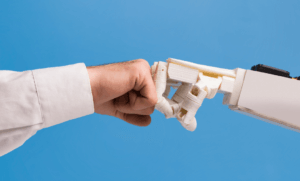
Artificial Intelligence in healthcare is rapidly advancing, revolutionizing various aspects of patient care and medical research. Here’s an overview of its key applications:
- Enhancing Diagnosis and Management of Diseases: AI is instrumental in aiding medical professionals with accurate disease diagnosis and effective treatment plans, notably in areas like kidney disease.
- Facilitating Medical Research: Institutions like the Children’s Hospital of Philadelphia use AI to integrate diverse medical data, aiding in disease research and discovery.
- Predictive Analysis in Patient Care: AI and machine learning are utilized for predicting health outcomes and diagnosing conditions, such as COVID-19, by analyzing data from portable devices.
- Virtual Assistants and Conversational AI: These AI tools are becoming more sophisticated in healthcare, assisting in patient triage, symptom checking, and providing pre-appointment guidance.
- Streamlining Appointment Scheduling: Automated scheduling systems powered by AI are becoming more common, particularly in primary care, improving efficiency and patient access.
- Integrating Wearable Health Data: AI is expected to play a crucial role in combining data from wearable health devices with comprehensive health records, aiding in personalized patient care. Here are the top three AI healthcare tools in 2023.
In 2023, several AI tools are exemplifying these applications in health industry.
- MDClone: A data analytics platform that empowers healthcare collaboration, enabling professionals to efficiently analyze and interpret health data.
- Tempus: Offers a vast library of clinical and molecular data, along with an operating system to manage and analyze this data, aiding in medical research and patient care.
- DrugCard: Specializes in AI-enabled screening of pharmaceutical literature, streamlining research and development in the pharmaceutical industry.
These applications highlight AI’s role in enhancing healthcare efficiency, advancing medical research, and personalizing patient care.
(4) AI Application in Finance:
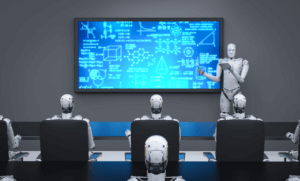
Artificial Intelligence (AI) has a transformative impact on the finance sector, with its applications spanning various aspects:
- Algorithmic Trading: AI algorithms analyze market trends and data to make automated, high-speed trading decisions, outperforming manual trading strategies.
- Fraud Detection and Prevention: AI systems efficiently identify unusual patterns and potential fraudulent activities in financial transactions, significantly reducing the risk of fraud.
- Risk Management: AI helps in assessing credit risks and market risks by analyzing vast amounts of data, thereby aiding financial institutions in making informed lending and investment decisions.
- Personalized Banking Services: AI powers chatbots and virtual assistants, providing customers with personalized financial advice and enhancing customer service in banking.
- Regulatory Compliance: AI tools assist in compliance monitoring by tracking and ensuring that financial operations adhere to changing regulations and standards.
Here are the top two AI tools in finance for 2023

